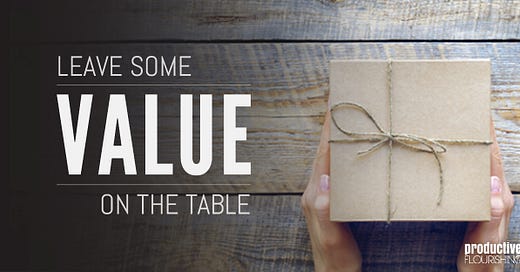Leave Some Value On The Table
Most religious and ethical traditions have a prescription to make the world around you a better place. Whether it's access to divine rewards or the awareness that you've done what a reasonable, ethical human should, there's generally been a moral or religious benefit to spreading value throughout the world.
I'm going to reframe these prescriptions into the single idea that you should leave more value on the table than you take from it. I'm doing this simply to avoid the overwhelm that some people feel by the prescription to change the world - the world is so huge, there's so much to do, and where do I start? It's simple enough to start by leaving more value than you take, and doing so, at the very minimum, overcomes the natural inclination towards greed.
But humans aren't just consumers; we're creators, as well. The people we call creative - or who self-identify as creative - are the people who actively change the world around them. But the ability to create is not inherently valuable, for we can create things that add value to the world or we can create things that take value from the world. So the onus to leave more value on the table may seem especially burdensome for creative people precisely because creatives are the ones who are most able to take more from the table in the long run. It doesn't take a lot of brainpower to steal a TV; it takes loads to embezzle millions from people for years without getting caught.
With power comes responsibility, indeed.
The truth, though, is that you are better off if you create more value in the world than what you take. If you focus on creating value in the world and sharing it with others, then you end up being more creative and productive than if you focus your creative energy on extracting value from the world. The days of strip-mining value out of people are over, for that only worked when people didn't have knowledge or options. It doesn't take long for people to find less coercive options now, and when they do, they're gone. No more value for you (at least from them).
If, instead of harvesting the fields of value that are already here, you focus on planting seeds of value in new fields, you can nourish yourself with some degree of autonomy while nourishing others at the same time. When the economic costs of growing ideas, products, and services approaches zero, the situation becomes such that there are more opportunities for more yield than any single person or family could ever consume on their own. So, teach yourself to fish, and you will feast for as long as there are fish; teach yourself to farm, and you will feast for as long as you live.
This is not a suggestion to give everything away for free - that's unsustainable, counter-productive, and doesn't honor yourself as a person. You have to take care of yourself before you can take care of others. Instead, this is a call to focus your passion and creativity on creating value that you can share with others, for brilliant, creative, and compassionate people lose more by withholding what they have and not exchanging value than by leaving more of what they have on the table.
Create awesome stuff, share it, and leave some value on the table. It's good, yet good for you.





